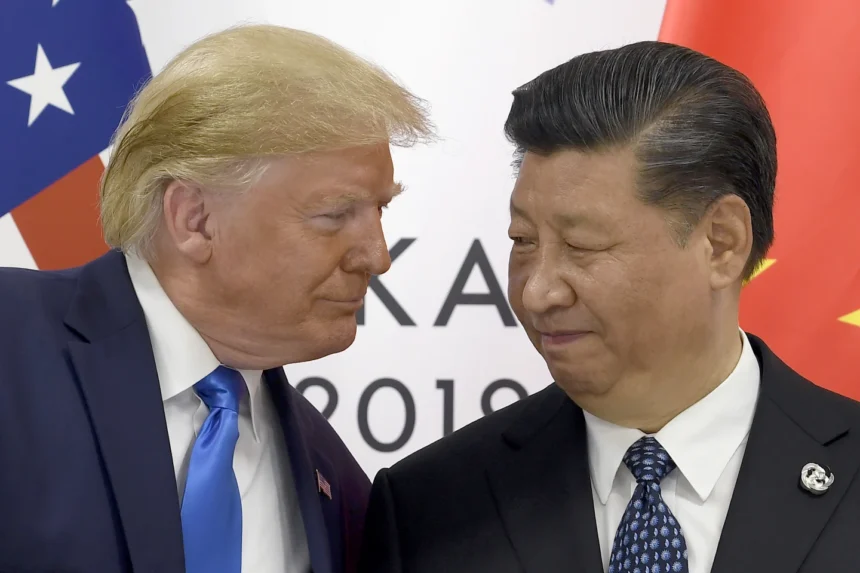President Donald Trump’s recent decision to authorize direct military aid to Israel by striking Iranian nuclear targets has sent ripples far beyond the Middle East, with experts suggesting the actions will inevitably reverberate in the Asia-Pacific, Washington’s priority theater.
On June 22, ten days into the war between Israel and Iran, Trump’s administration employed bunker-buster bombs dropped by B-2 stealth bombers and Tomahawk cruise missiles from a submarine to hit three Iranian nuclear sites. This move aimed to dismantle Iran’s nuclear program even while negotiations between Washington and Tehran were ongoing. The strikes led to a pro forma Iranian retaliatory strike on a U.S. base in Qatar with no casualties, and a ceasefire between Iran and Israel was agreed upon on June 24.
Duyeon Kim, a senior analyst at the Center for a New American Security in Seoul, South Korea, stated, “Trump’s strikes on Iran show that he’s not afraid to use military force — this would send a clear message to North Korea, and even to China and Russia, about Trump’s style.” She added that Pyongyang and Beijing might have previously assumed Trump was risk-averse based on his first presidency.
Condemnation from China, North Korea, and Russia
Immediately following the American attack, North Korea, China, and Russia swiftly condemned the action. Russian President Vladimir Putin called it “unprovoked aggression,” China’s Foreign Ministry deemed it a violation of international law that “exacerbated tensions in the Middle East,” and North Korea’s Foreign Ministry asserted it “trampled down the territorial integrity and security interests of a sovereign state.”
While the strikes achieved tactical success, their broader strategic impact on Washington’s Middle East goals, or whether they will push Iran to redouble efforts for a nuclear deterrent, remains to be seen.
Implications for U.S. Allies and Adversaries in Asia
If the Iran attack remains an isolated incident, U.S. allies in the Asia-Pacific are likely to view it as a positive sign from the Trump administration regarding its willingness to uphold “red lines” and restore deterrence, according to Euan Graham, a senior defense analyst with the Australian Strategic Policy Institute. He noted that “China will take note that Trump is prepared to use force, at least opportunistically.”
In China, the perception of Trump as having a “no-war mentality” will undergo reassessment, said Zhao Minghao, an international relations professor at China’s Fudan University in Shanghai. He emphasized that “the way the U.S. used power with its air attacks against Iran is something China needs to pay attention to,” influencing future U.S.-China interactions. However, Zhao cautioned against assuming the same strategy could be applied to Beijing, given the higher stakes.
Different Challenges from Nuclear-Armed Nations
China and North Korea pose distinct challenges from Iran, primarily because both already possess nuclear weapons, significantly increasing the risks of retaliation in any conflict. Additionally, there is no Asian equivalent of Israel, whose sustained attacks on Iranian missile defenses facilitated the B-2 bombers’ unimpeded operations.
Nevertheless, the possibility of U.S. involvement in a conflict with China or North Korea is real, prompting Beijing and Pyongyang to analyze the unpredictable Trump’s potential responses.
Joseph Dempsey, a defense expert with the International Institute for Strategic Studies, believes North Korea will be “quite alarmed” by Israel’s successful actions against Iran, while simultaneously viewing it as justification for its own nuclear weapons program. “If Iran did have deployable nuclear weapons would this have occurred? Probably not,” Dempsey remarked.
Hong Min, a senior analyst at South Korea’s Institute for National Unification, highlighted that the U.S. attack during ongoing talks with Iran will not go unnoticed. He suggested North Korea “may conclude that dialogue, if done carelessly, could backfire by giving the United States a pretext for possible aggression.” This could lead North Korea to adopt a more passive stance on negotiations with Washington, focusing instead on internal military buildup and closer ties with Russia, thereby narrowing prospects for future talks.
Taiwan’s Perspective
China will interpret these events through the lens of Taiwan, the self-governing island Beijing claims as its territory. Drew Thompson, a senior fellow with the Singapore-based RSIS Rajaratnam School of International Studies, raised the question of whether the Iran strike indicates the U.S. might show less restraint than expected by China in responding to a Taiwan invasion, potentially even striking the Chinese mainland. He also stressed the “difficulty of predicting Trump’s actions.”
Conversely, Lyle Goldstein, director of the Asia Program at the Washington-based think tank Defense Priorities, expressed concern that Taiwan’s President Lai Ching-te, who has escalated warnings about the Chinese threat, might be emboldened in his rhetoric. Goldstein worried Taiwan might “try to take advantage of the American use of force against Iran to increase its deterrent situation versus the mainland,” calling it an “exceedingly risky gambit.”







